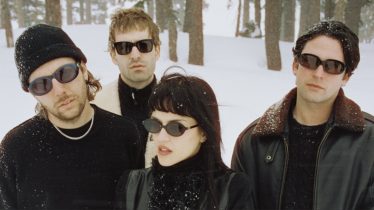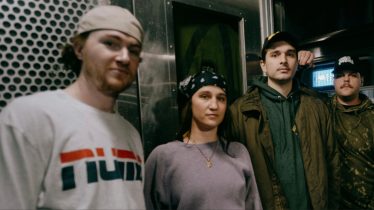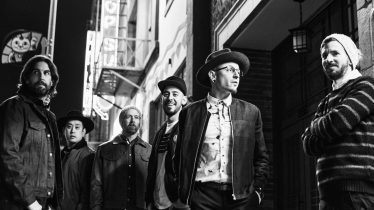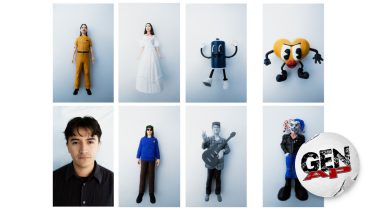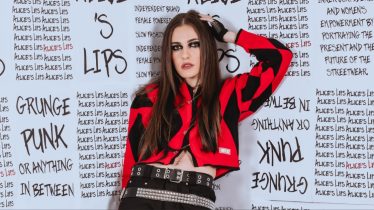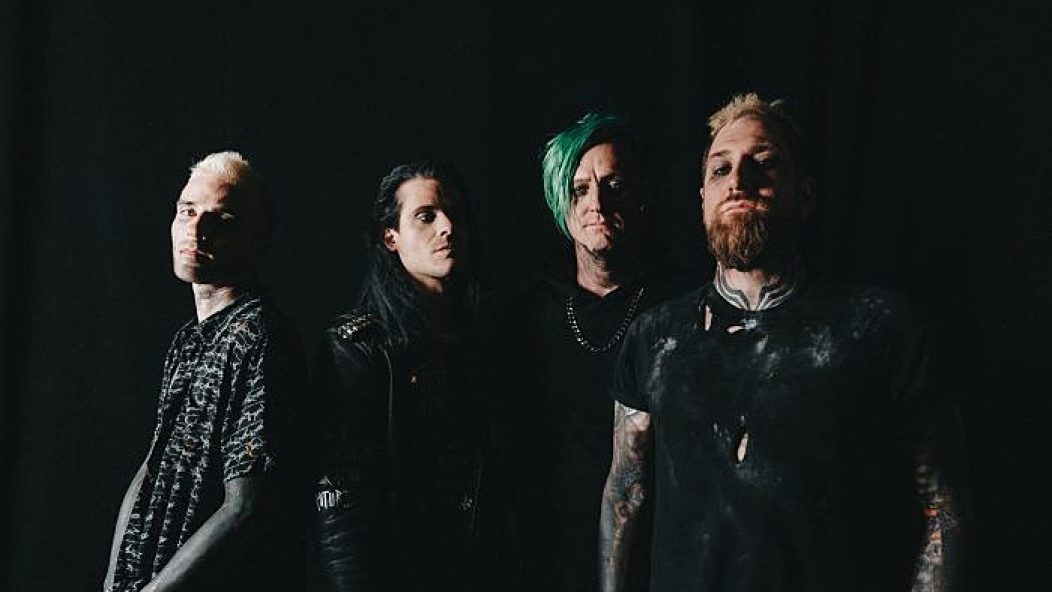
DED's positive message behind their new album 'School Of Thought'
Established six years ago purely as a means of paying homage to their metal forefathers Korn, Slipknot and Pantera, the buzz surrounding DED soon grew way beyond the members’ expectations. Before they knew it, the band were caught up in a whirlwind of intense touring, mounting public attention and the opportunity to record their debut album with legendary producer John Feldmann.
That fateful opportunity resulted in the four-piece’s storming debut effort, Mis•an•thrope. It detailed a disillusion with humankind and its failures through classic nü-metal melodies and industrial-inspired grinding riffs. That was accompanied by a slick, dark image, including white contact lenses and a thoroughly on-brand “dead” aesthetic. Where later additions to the nü-metal history books tarred the genre with self-important, shallow, morally diluted lyrics and music made purely for income and popularity, DED make a defiant return to the reasons nü metal came to fruition in the first place — giving the misfits of metal a safe space to speak up and thrive.
Read more: DED’s ‘School Of Thought’ calls for self-reflection and healthy living
However, much like the iconic metal bands that blazed the trail before them, each album brings with it a new blueprint, a departure from the past template to establish a new world order. Taking their time to allow the outfit’s next era to grow in its own space, DED return in 2021 after a whopping four years and a plethora of tours (Korn, blessthefall) with a voracious new record, School Of Thought. It’s crammed to the rafters with tracks to once again make listeners think twice about their lives and the effect their actions make on the world around them, arriving just in time for post-pandemic reflections on the hard lessons of the last year-and-a-half.
Their present-day sound draws in a wider range of inspirations, paying tribute to their peers alongside flexing their own instrumental prowess garnered from their cumulative years in the music industry. Their now-trademark dark aesthetic delves into the grungier side of the spectrum, ditching their unifying white contacts in favor of blackened accents and a live presence worthy of their nü-metal predecessors.
The new generation of rock and metal stars are a lot less egotistical and more wholesome. You’re bringing back the concept that musicians are worth looking up to. Which bands inspired your approach to your music career and the distancing from self-centered stars?
I got my first guitar because of Nirvana. My first band was a punk band into things like Alkaline Trio and Slapstick, MxPx. That was the beginning of things. I really come from that punk-rock world, which is definitely not about the grandiose stuff. There’s an ethos that comes with that, a punk-rock and hardcore mentality of just wanting to make music, and if people like it, people like it. We don’t stand for the misogyny of the past. That was a different time. We’re definitely more about the music and being humble, legit people; our music is angry, but underneath all of it, there’s a huge positive message about trying to help people think about who they are, what they stand for, what they consume, taking a look at the world around us and what humanity is.
We share the themes of self-empowerment from punk rock, hardcore and metal, even though a lot of people have us pegged as nü-metalcore because we definitely draw from that genre’s sounds like Limp Bizkit, Deftones and System Of A Down. Those bands were all legit, but after the more watered-down second wave of nü metal, that genre gets pegged with slightly dumbed-down lyrics when people look at them from the surface. That wave was doing a shallow version of things, whereas we definitely try to have more conscious lyrics about being the best version of yourself.
DED are all about the bleak aesthetics — you all wore white contact lenses throughout your last album cycle. What new image features can we expect to see through this next era?
We did contacts for a while. We had black straitjackets when we first started and moved into street clothes with white contacts. This time around, I want to go through different phases for us. I don’t wanna be locked in a box where we have to do the same thing forever. In between Mis•an•thrope and now, which is such a weird time for us, we’ve toured a bit, and I was doing almost like a Viking thing with my image.
I love having different eras. When I look at David Bowie, Metallica [and] Lady Gaga, they’ve always adapted, changed and made it exciting, and that’s what we wanna do too. We want to go with whatever feels right in the moment because you grow every year. You’re never the same person as you were five years ago, which is true for us. Unless you find something timeless and incredible so that becomes your thing. For us right now, it’s an ever-evolving image, and we’re having fun with it.
Coming from the punk world, I used to be anti-dressing up, and that wasn’t cool for me at all. I hated it, actually. But once I started doing it, I grew up and realized I was having fun with it. We had fans starting to wear our white contacts, and it was a really cool thing after being so against it for years. I’ve embraced it a lot and done a lot of research into it, looking into Alice Cooper and White Zombie and all the bands that started it. When you get into that character, there’s something that happens to you, and you really feel empowered by it.
It’s been a massive four years since your last full-length, Mis•an•thrope, in 2017. Four years is a lifetime in this industry, and fans have been begging you for a new album ever since. How long has this new effort been in the works?
When we first started touring, we were so busy, and we’d never done that amount of touring before, so it was a whirlwind. The first album and the band got received so well. It exceeded our expectations, so we were caught up in it and just kept going and going. We toured nonstop, but eventually we went, “OK, we’ve got to do another album.” We got in with producer Kevin Churko for this second album, who is a legend. He’s done Ozzy Osbourne records, In This Moment, Five Finger Death Punch, a bunch of really cool stuff. We were still touring in between recording sessions, and Kevin was recording big bands in between our sessions, too.
John Feldmann did the same thing when we were out with him. He was doing Black Veil Brides and blink-182 simultaneously, so we actually used Travis Barker’s drum kit for our first album. Mark [Hoppus] was the first one to release a DED song on his podcast, so we have huge love for the blink guys.
We made this second album with Kevin out in Las Vegas over three or four months back and forth between touring, and it was incredible. After being in music for a while, you go through different phases as artists. You experience that frustration and self-doubt through time. I had an older band where we were writing songs and sending them in, and it felt like we were losing the soul of things, which is why DED is so awesome. Because we did it strictly for fun with no intentions, and then it ended up being the most successful, well-received thing I’ve ever worked on.
How does the name School Of Thought correlate to the music we’re about to hear on the record?
Most of my lyrics are conscious lyrics, but it all depends on how you listen to it. This album is all about thinking about what you do, being cognitive, being conscious and being aware of what you consume and what you support.
That angle comes from me because I’ve had some really tough bouts of anxiety over the last 10 years. I’ve gone to cognitive therapy and a lot of different things, and it’s made me take a step back. It’s changed my whole viewpoint on things. It makes me want to tell people to take control of their brains, their thought process, their bodies and be healthy, everything that changed my life because I was really struggling with anxiety and bouts of depression. I don’t use depression lightly. That’s not a word I like to throw around, and it’s thrown around a lot more than it should be, but I definitely had feelings of that as well throughout time.
I was also drinking a lot and eating poorly, all those things. I’ve done a lot of research on how to be healthy without medicines and shit like that because medicines are just a little Band-Aid you stick on it, and the drug companies keep giving it to you — they don’t want to fix you.
All the lyrics are about taking a step back, thinking about yourself, thinking about what we take as everyday stuff. The term “school of thought” is about a group of people that think a certain way and have a certain ethos, so I really wanted that to be a part of everything — for people to listen to the music to dig deep into the lyrics and to understand that even though it’s negative-sounding, it’s all positive underneath.
The first singles from the album, “Parasite” and “Kill Beautiful Things,” are great introductions to your new era, leaning toward the punchy and melodic sound that will definitely draw a huge energy from crowds at live shows. How does this sound compare to what we’ll hear on the rest of the album?
“Kill Beautiful Things” is probably the most melodic and the lightest song on the album, but it feels like a really strong song. The chorus is big. Our new guitar player Alex Adamcik sent me the riff, and it felt like Deftones and Thirty Seconds To Mars, and I was way into it. We like all kinds of music here. Our first album really homed in on our nü-metal influences because we were just having fun. This time around, those influences are still there. The two songs from the Mannequin Eyes EP are going to be on the album as well, and the track “Parasite” fully showcases a lot of different vibes, from Static-X to Lamb Of God, in my opinion.
School Of Thought is still DED, but it’s broadened out with more influences included in it, so I think it’s a lot more dynamic. It made us happy when we made it, and it makes me happy when I listen to it now, which is what the first album did. So we’re just going with it, making music that makes us happy, and hopefully, it makes other people feel good, inspired or affected.
As a songwriter, I just like a good song. I don’t care if it’s seven minutes long or one minute long, as long as it resonates with me. We’re all humans, so we’re all made up of the same kind of thing, and we all feel things in similar ways. So if those beats, grooves, melodies, lyrics [or] frequencies feel good in my body, then hopefully it’ll feel good in someone else’s body in some way.
DED songs have always carried more weight than your average metal hit — there’s a deeper meaning and moral message throughout that gives your music an added impact, whether you’re listening to an album from front to back or dipping into individual songs. Which track from School Of Thought means the most to you personally?
“Kill Beautiful Things” is one of the tracks that’s really close to me. Truthfully, it’s like a story of me growing up and not understanding war, racism or classism or separation of religion; basically not understanding why humans were being what they were being. Especially being a kid, you’re there like, “Why don’t we all just skateboard and play basketball?” When you become an adult, you get affected by it. At least I did. I got bitter and negative sometimes, which led to me doing things that I wasn’t ultimately proud of. You have survival instilled in your DNA. It’s just something that you do — if someone hits you, you wanna hit them back.
Really, this song is to remind myself of my purpose, my morals, my ethics and what’s important to me and to always stay in that through fire, strife, turmoil and everything. “I kill all of the beautiful things to keep me alive in a world so cold” — hopefully, that line makes sense because the world, nature, the universe is all so beautiful, and life in its true essence is love and experience and beauty, electricity and energy.
You’re out there in the world, and you’re doing things you shouldn’t do because you feel like you need to survive. However, I think you can always maintain a level of consciousness and integrity through everything you do. That’s me thinking as a work in progress because we’re all just works in progress. We’re all trying to be better than we were the day before, or at least that’s what I’m trying to do.
This interview appeared in issue 399, available here.
